大学英语教材二单元
- 格式:docx
- 大小:37.28 KB
- 文档页数:3
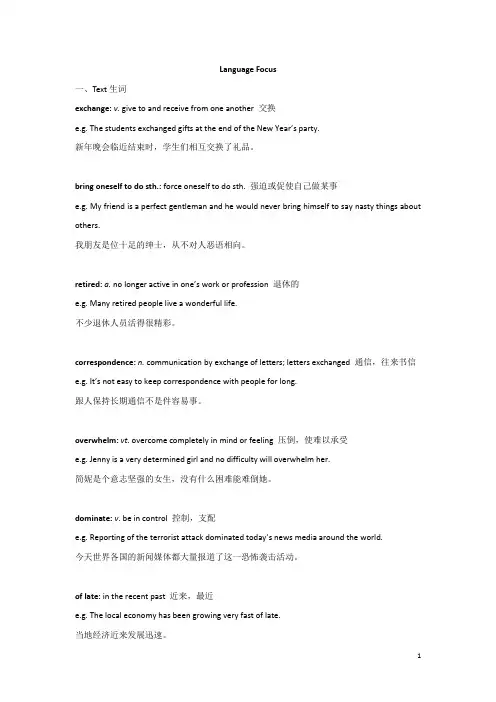
Language Focus一、Text生词exchange:v. give to and receive from one another 交换e.g. The students exchanged gifts at the end of the New Year’s party.新年晚会临近结束时,学生们相互交换了礼品。
bring oneself to do sth.: force oneself to do sth. 强迫或促使自己做某事e.g. My friend is a perfect gentleman and he would never bring himself to say nasty things about others.我朋友是位十足的绅士,从不对人恶语相向。
retired:a. no longer active in one’s work or profession 退休的e.g. Many retired people live a wonderful life.不少退休人员活得很精彩。
correspondence:n. communication by exchange of letters; letters exchanged 通信,往来书信e.g. It’s not easy to keep correspondence with people for long.跟人保持长期通信不是件容易事。
overwhelm:vt. overcome completely in mind or feeling 压倒,使难以承受e.g. Jenny is a very determined girl and no difficulty will overwhelm her.简妮是个意志坚强的女生,没有什么困难能难倒她。
dominate:v. be in control 控制,支配e.g. Reporting of the terrorist attack dominated today’s news media around the world.今天世界各国的新闻媒体都大量报道了这一恐怖袭击活动。
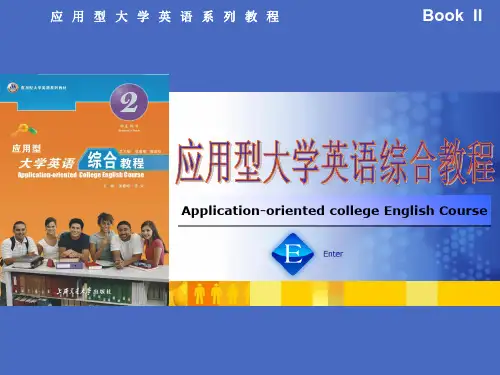
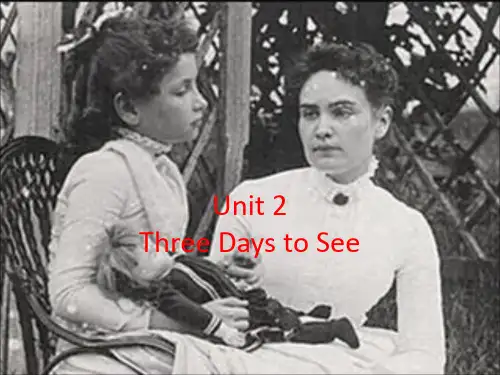
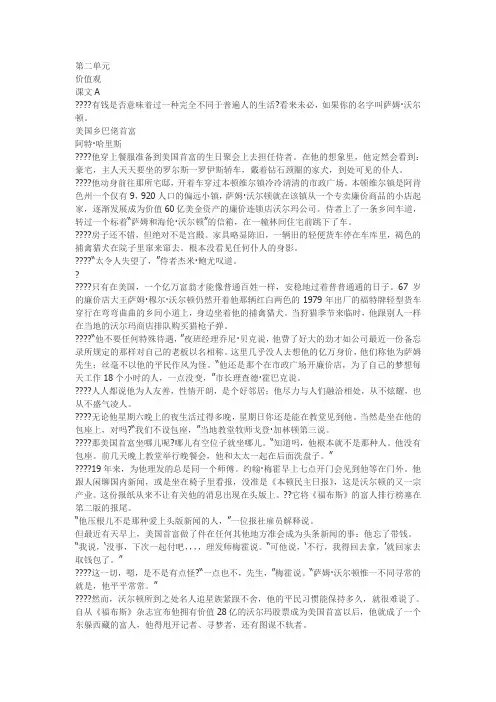
第二单元价值观课文A有钱是否意味着过一种完全不同于普遍人的生活?看来未必,如果你的名字叫萨姆·沃尔顿。
美国乡巴佬首富阿特·哈里斯他穿上餐服准备到美国首富的生日聚会上去担任侍者。
在他的想象里,他定然会看到:豪宅,主人天天要坐的罗尔斯一罗伊斯轿车,戴着钻石颈圈的家犬,到处可见的仆人。
他动身前往那所宅邸,开着车穿过本顿维尔镇冷冷清清的市政广场。
本顿维尔镇是阿肯色州一个仅有9,920人口的偏远小镇,萨姆·沃尔顿就在该镇从一个专卖廉价商品的小店起家,逐渐发展成为价值60亿美金资产的廉价连锁店沃尔玛公司。
侍者上了一条乡间车道,转过一个标着“萨姆和海伦·沃尔顿”的信箱,在一幢林间住宅前跳下了车。
房子还不错,但绝对不是宫殿。
家具略显陈旧,一辆旧的轻便货车停在车库里,褐色的捕禽猎犬在院子里窜来窜去。
根本没看见任何仆人的身影。
“太令人失望了,”侍者杰米·鲍尤叹道。
只有在美国,一个亿万富翁才能像普通百姓一样,安稳地过着普普通通的日子。
67岁的廉价店大王萨姆·穆尔·沃尔顿仍然开着他那辆红白两色的1979年出厂的福特牌轻型货车穿行在弯弯曲曲的乡间小道上,身边坐着他的捕禽猎犬。
当狩猎季节来临时,他跟别人一样在当地的沃尔玛商店排队购买猎枪子弹。
“他不要任何特殊待遇,”夜班经理乔尼·贝克说,他费了好大的劲才如公司最近一份备忘录所规定的那样对自己的老板以名相称。
这里几乎没人去想他的亿万身价,他们称他为萨姆先生;丝毫不以他的平民作风为怪。
“他还是那个在市政广场开廉价店,为了自己的梦想每天工作18个小时的人,一点没变,”市长理查德·霍巴克说。
人人都说他为人友善,性情开朗,是个好邻居;他尽力与人们融洽相处,从不炫耀,也从不盛气凌人。
无论他星期六晚上的夜生活过得多晚,星期日你还是能在教堂见到他。
当然是坐在他的包座上,对吗?“我们不设包座,”当地教堂牧师戈登·加林顿第三说。
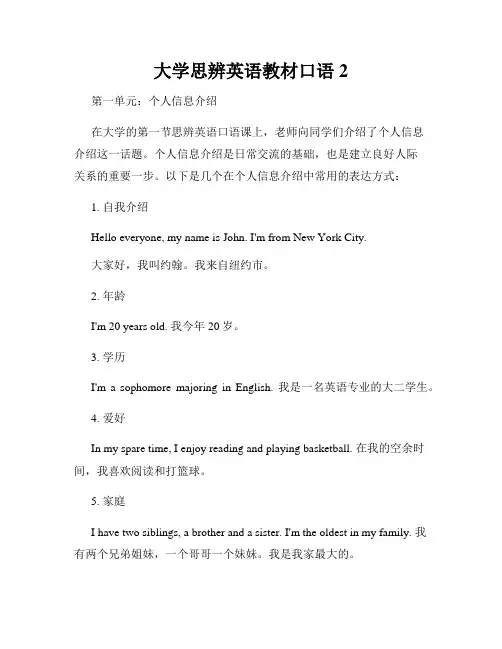
大学思辨英语教材口语2第一单元:个人信息介绍在大学的第一节思辨英语口语课上,老师向同学们介绍了个人信息介绍这一话题。
个人信息介绍是日常交流的基础,也是建立良好人际关系的重要一步。
以下是几个在个人信息介绍中常用的表达方式:1. 自我介绍Hello everyone, my name is John. I'm from New York City.大家好,我叫约翰。
我来自纽约市。
2. 年龄I'm 20 years old. 我今年20岁。
3. 学历I'm a sophomore majoring in English. 我是一名英语专业的大二学生。
4. 爱好In my spare time, I enjoy reading and playing basketball. 在我的空余时间,我喜欢阅读和打篮球。
5. 家庭I have two siblings, a brother and a sister. I'm the oldest in my family. 我有两个兄弟姐妹,一个哥哥一个妹妹。
我是我家最大的。
第二单元:日常交流在大学生活中,日常交流是不可避免的。
无论是和同学们、老师们还是外国朋友交流,良好的口语表达能力都非常重要。
下面是几个日常交流中常用的句子:1. 问候Hi, how are you doing? 嗨,你怎么样?2. 讨论天气It's a nice day today, isn't it? 今天天气不错,对吧?3. 邀请Would you like to have dinner with us tonight? 今晚你想和我们一起吃饭吗?4. 表达喜好I'm a big fan of basketball. 我是个篮球迷。
5. 请求帮助Could you please help me with my homework? 你能帮我一下我的作业吗?第三单元:社交场合大学时光不仅仅是学习,也是结交新朋友,拓展人脉的好时机。
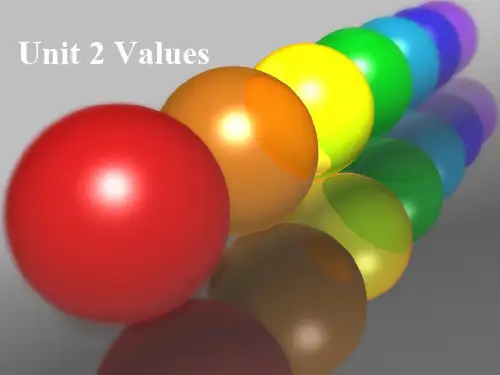
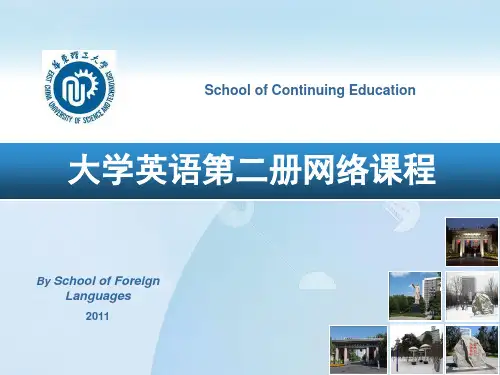
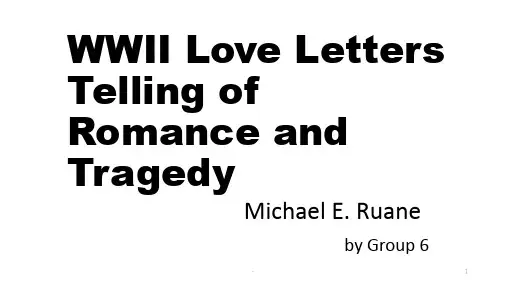
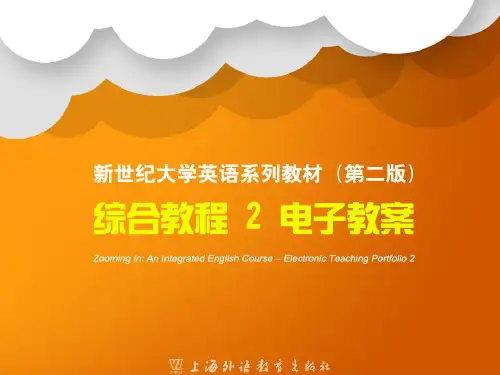
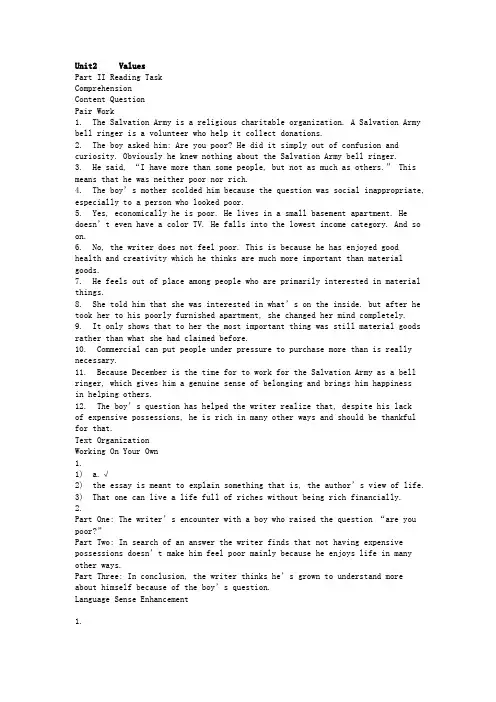
Unit2 ValuesPart II Reading TaskComprehensionContent QuestionPair Work1. The Salvation Army is a religious charitable organization. A Salvation Army bell ringer is a volunteer who help it collect donations.2. The boy asked him: Are you poor? He did it simply out of confusion and curiosity. Obviously he knew nothing about the Salvation Army bell ringer.3. He said, “I have more than some people, but not as much as others.” This means that he was neither poor nor rich.4. The boy’s mother scolded him because the question was social inappropriate, especially to a person who looked poor.5. Yes, economically he is poor. He lives in a small basement apartment. He doesn’t even have a color TV. He falls into the lowest income category. And so on.6. No, the writer does not feel poor. This is because he has enjoyed good health and creativity which he thinks are much more important than material goods.7. He feels out of place among people who are primarily interested in material things.8. She told him that she was interested in what’s on the inside. but after he took her to his poorly furnished apartment, she changed her mind completely.9. It only shows that to her the most important thing was still material goods rather than what she had claimed before.10. Commercial can put people under pressure to purchase more than is really necessary.11. Because December is the time for to work for the Salvation Army as a bell ringer, which gives him a genuine sense of belonging and brings him happinessin helping others.12. The boy’s question has helped the writer realize that, despite his lackof expensive possessions, he is rich in many other ways and should be thankful for that.Text OrganizationWorking On Your Own1.1) a.√2) the essay is meant to explain something that is, the author’s view of life.3) That one can live a life full of riches without being rich financially.2.Part One: The writer’s encounter with a boy who raised the question “are you poor?”Part Two: In search of an answer the writer finds that not having expensive possessions doesn’t make him feel poor mainly because he enjoys life in many other ways.Part Three: In conclusion, the writer thinks he’s grown to understand more about himself because of the boy’s question.Language Sense Enhancement1.(2) wear and tear(3) dependable(4) modest(5) primarily(6) minimal(7) exceptionally(8) illness-free(9) spirited(10) energizingLanguage FocusVocabularyI1.1) abrupt2) emotional3) bless4) wear and tear5) dated6) consequences7) seemingly8) in contrast to9) Curiosity10) genuine11) primarily12) sentiments2.1) confronted with more than one problem, try to solve the easiest one first.2) vital to the existence of all forms of life.3) some confusion among the students about what to do after class to follow up on the subject.4) nothing more than a job and an apartment to be happy.5) tickled him to think that she’d come to ask his advice3.1) a lingering; fabricating; sentiments2) fill out; every item; vital; consequences3) be denied; tangible; cherish; attainII1. It is a long trip and will take us five hours by bus.2. She arrived early and took a front row seat.3. Don’t take me for a fool.4. It takes a lot of imagination to fabricate such a story.5. My uncle will take me (along on his trip) to the Arctic this summer.6. He took the dinner plate I passed to him.7. Kevin took second prize in the weight-lifting competition.8. If yo u don’t take my advice, you will regret it.III2. to give3. to return4. being praised5. not having written6. to say7. to open8. being helpedComprehensive ExercisesI. cloze1.(1) well-off/affluent(2) dated(3) falling into(4) bracket(5) deny(6) tangible(7) pursuit(8) cherishes(9) out of place(10) abrupt(11) focus(12) donations2.(1) consume(2) fueled(3) annual(4) plain(5) physically(6) security(7) indicates(8) equally(9) traditional(10) followIII. Translation1.1) The company denied that its donations had a commercial purpose.2) Whenever he was angry, he would begin to stammer slightly.3) Education is the most cherished tradition in our family. That’s why my parents never took me to dinner at expensive restaurants, but sent me to the best private school.4) Shortly after he recovered from the surgery, he lost his job and thus had to go through another difficult phase of his life.5) In contrast to our affluent neighbors, my parents are rather poor, but they have always tried to meet our minimal needs.2.With more and more donations coming in, our university will be much better off financially next year. We will thus be able to focus on the most important task that we, educators, must take on: to encourage students to attain their scholarly/academic goals, to train them to be dependable and responsible individuals, to prepare them for the life ahead, and to guide them in their pursuit of spiritual as well as material satisfaction.。
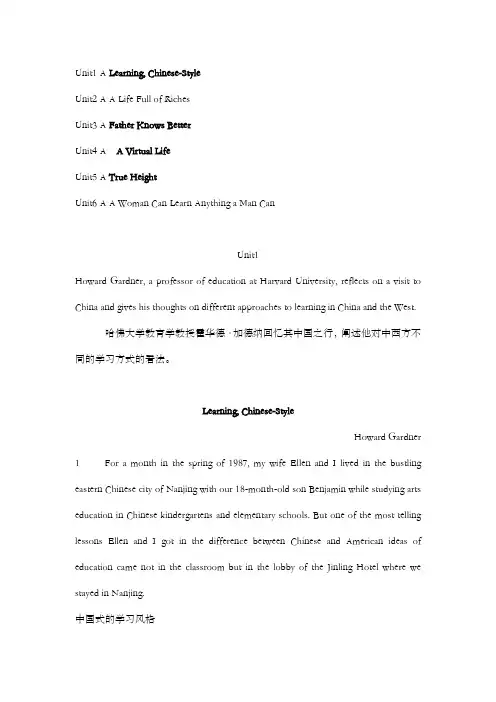
Unit1 A Learning, Chinese-StyleUnit2 A A Life Full of RichesUnit3 A Father Knows BetterUnit4 A A Virtual LifeUnit5 A True HeightUnit6 A A Woman Can Learn Anything a Man CanUnit1Howard Gardner, a professor of education at Harvard University, reflects on a visit to China and gives his thoughts on different approaches to learning in China and the West.哈佛大学教育学教授霍华德·加德纳回忆其中国之行,阐述他对中西方不同的学习方式的看法。
Learning, Chinese-StyleHoward Gardner 1 For a month in the spring of 1987, my wife Ellen and I lived in the bustling eastern Chinese city of Nanjing with our 18-month-old son Benjamin while studying arts education in Chinese kindergartens and elementary schools. But one of the most telling lessons Ellen and I got in the difference between Chinese and American ideas of education came not in the classroom but in the lobby of the Jinling Hotel where we stayed in Nanjing.中国式的学习风格霍华德·加德纳1987年春,我和妻子埃伦带着我们18个月的儿子本杰明在繁忙的中国东部城市南京住了一个月,同时考察中国幼儿园和小学的艺术教育情况。
Competition adj. competitive 竞争的竞争的 competing 相互矛盾的adv. competitively 有竞争力地n. competitor 竞争者,对手vi. compete 竞争;比赛;对抗竞争;比赛;对抗Will you judge at the swimming competition next week 做评委做评委Sake n. 目的;利益;理由;日本米酒目的;利益;理由;日本米酒for any sake 无论如何无论如何for God's (或 Christ's, goodness', gosh, heaven's, mercy's, pity's) sake [口语][用于加强语气]天哪,哎呀;看在上帝份for old time's sake 看在老交情的看在老交情的athlete adj. athletic 运动的,体格健壮的n. athleticism 竞技热;运动竞赛竞技热;运动竞赛I was no athlete. 我完全不是运动型的人。
我完全不是运动型的人。
Sacrifice n. 牺牲;祭品;供奉vt. 牺牲;献祭;亏本出售vi. 献祭;奉献献祭;奉献V-T To sacrifice an animal or person means to kill them in a special religious ceremony as an offering to a god. 献祭献祭 The priest sacrificed a chicken. 牧师献祭了一只鸡。
牧师献祭了一只鸡。
2.N-COUNT 祭品祭品 ...animal sacr ifices to the gods. …献给众神的动物祭品。
献给众神的动物祭品。
献给众神的动物祭品。
3.V-T If you sacrifice something that is valuable or important, you give it up, usually to obtain something else for yourself or for other people. 舍弃; 牺牲牺牲She sacrificed family life to her career. 她为了她的事业牺牲了家庭生活。
⼤学英语综合教程第⼆册第⼆单元教案Unit2Unit 2 ValuesTeaching Aims:1.Understanding the main idea (one can live a life full of riches without beingrich funancially) and structure of the text2.Appreciate the wording (riches) in the title of the text3.Grasp the key languge points in Texts A and learn how to use them in context4.Unerstand the cultural background related to the content5.Express themselves more freely on the theme of Values after doing a series oftheme-related reading, listening, speaking, and writing activities6.Write an essay beginning with an anecdote or a piece of news, etc.Teaching Keypoints:1.Grasp the main idea of Text A and language points in Text A2.Cultural background in Text A3.Analysis of the difficult sentences in Text ATeaching Difficulties:1.Writing strategy and style demonstrated in Text A2.Write an essay with an anecdote or a piece of news, etc.Teaching Aids:Teaching, dicussion, exercises, group-activities, student-centredTeaching period: 12classesTeaching Procedure:Step 1Warming up1.Have students listen to the story about Abraham Lincoln before class, lead themto finish the exercises on page31, check the answer and explain.2.Have students learn more about the fact that economic development and personalincome can’t always account for happiness.3.Do you think rich people must be happier than poor people? Why?4.Do you think a poor person can have a life full of riches? How?5.In class, students form two camps to debate the following issue: Mother Teresahas no money, but she took care of the poor in Calcutta until her death. Bill Gates gave a lot of money to charity, but he seldom works in the “frontline”with the poor. Does the world need more love like Mother Teresa’s or more money like Bill Gates’?Step 2 Global analysisi of Text A1. Division of the Text APart1:The writer’s encounter with a boy who raised the question “Are you poor?”Part2:In search of an answer the writer finds that not having expensive possessions doesn’t make him feel poor mainly because he enjoys life in many other ways. Part3:In conclusion, the wr iter thinks he’s grown to understand more about himself because of the boy’s question.2.Understanding the main idea of the text with the help of the questions on page37-38Step 3. Detailed leaning of Text A1. It was early December 2003, my first season as a Salvation Army bell ringer, whenI was confronted with the questionWhat does a Salvation Army bell ringer do?To ring the bell and ask people to donate money to help the poor.2. confront: vt.1) (of a problem, difficulty, etc.) face (sb.) threateninglyThe difficulties that confront us seem insuperable.A major difficulty that confronts international students is how best to judge the quality of a program in a foreign university2) (of a person) face and deal with (a problem, difficulty, etc.)军⼈必须⾯对危险和死亡。
教学目标:1. 知识目标:掌握本单元的词汇和语法知识,了解沟通的重要性。
2. 能力目标:提高学生的听说能力,培养学生运用英语进行有效沟通的能力。
3. 情感目标:激发学生对沟通重要性的认识,培养学生良好的沟通意识。
教学重点:1. 词汇:important, communication, listen, speak, understand, express, etc.2. 语法:现在进行时,一般将来时。
教学难点:1. 学生能够运用所学词汇和语法知识进行实际沟通。
2. 学生能够理解并表达沟通的重要性。
教学准备:1. 教材:新世纪大学英语读写教程(第二册)2. 多媒体课件3. 情景图片教学过程:一、导入1. 教师展示情景图片,引导学生思考沟通在生活中的重要性。
2. 学生自由发言,分享自己对于沟通的看法。
二、词汇教学1. 教师通过课件展示本单元的词汇,并解释其意思和用法。
2. 学生跟读并模仿教师,加深对词汇的记忆。
三、语法教学1. 教师讲解现在进行时和一般将来时的用法,并举例说明。
2. 学生练习运用所学的语法知识进行句子构造。
四、听说训练1. 教师设计一个简单的对话场景,引导学生进行角色扮演。
2. 学生分组练习,教师巡视指导,纠正发音和语法错误。
五、阅读理解1. 教师带领学生阅读课文,并提问检查学生对文章的理解程度。
2. 学生回答问题,教师点评并总结。
六、写作训练1. 教师布置写作任务,要求学生运用所学词汇和语法知识写一篇关于沟通重要性的短文。
2. 学生完成写作,教师批改并给予指导。
七、课堂小结1. 教师总结本节课所学内容,强调沟通的重要性。
2. 学生分享自己在课堂上的收获。
教学反思:本节课通过多种教学手段,如情景导入、词汇讲解、语法教学、听说训练、阅读理解和写作训练等,帮助学生掌握本单元的知识点,提高学生的英语听说读写能力。
在教学过程中,教师应关注学生的个体差异,针对不同层次的学生给予相应的指导。
同时,教师应注重培养学生的沟通意识,让学生在实际生活中运用所学知识。
大学英语综合课程(二)第二单元QuizPart 1 Fill in the blanks with the help of the first letter(s)(每题: 1 分,满分10 分 )Directions: Fill in the blanks with the help of the first letter(s).experts that the markets in this area for these cell phones will expand by200 percent in the next three years.(Suggested first letter(s): cal )is hoped that the governments throughout the world will take joint actions tothe economy and rescue the world from another economic crisis.(Suggested firstletter(s): b )public opinion, hard as the road for these students after school will be, theirare bright since they are all well-rounded.(Suggested first letter(s): pro )spite of his repeated failure, the Olympic hero must have determination, power,and passion to make sacrifices for the sake of glory to.(Suggested first letter(s): per )is the development strategy of the company to its overseas expansion so as to make more profit in the world market.(Suggested first letter(s): ac )is not to attribute reduction in mental function to getting old. In fact, the reduction might result from neglecting to stay physically active.(Suggested firstletter(s): lo )practice, the institutions are trying to move toward one language, withone or two other working languages.(Suggested first letter(s): dom )teenagers like to see frighteningly violent yet movies which may have some negative impact upon them.(Suggested first letter(s): com )activities in college enrich the students' life,cultivate their abilities to adapt to society, and possibly their studies.(Suggested first letter(s): p )book, The HumanUse of HumanBeings (1950),that robots taking over human jobs may eventually lead to growing unemployment.(Suggested first letter(s): spe )Part 2 Fill in the blanks with the given words( 每题: 1 分,满分20 分 )Directions: Fill in the blanks in the sentences with the words given in the box.Change the form where necessary.Questions 1 to 10 are based on the following passage or dialog.persist boost invest orientevaluate accumulate accelerate calculatespeculate undertake1. The United Nations official said to (1) a new peace move in the MiddleEast when there is a chance to reach an agreement.2.We might (2) further from the story and say that these people probablylived very close to the well because of the importance of water to life.3.As they are not sure about the situation in the flood-stricken area, they willfirst send trained nurses there to (3)the needs of each patient.4. If the extremely hostile relationships tend to (4), the conflictsbetween the two parties make it difficult to recognize that they share commonneedsand goals.5. As more students are inclined to choose business as their major, the college has to offer more courses that are business- (5).6. If workers believe inflation is likely to (6),they will demand higher wages to compensate for expected increases in prices.7.If you have a good planning to set aside 500 dollars per month, it would taketwo years to ________the minimum sum needed for your child.8.If the population continues to rise at the present rate, scientists have (8)that the world's population will double by the end of the century.9.The cost of repairing damaged public facilities is so high that some localgovernments are unwilling to (9)in the rebuilding projects.10. According to recent research reports,learning a new dance step may (10) the brain in the same way that learning a language does.Questions 11 to 20 are based on the following passage or dialog.enroll bother install investrecruit reform revise shrink acknowledge confirm1.Steve Jobs has been (11) as a genius in business; his greatest skills arehis insight, creative mind, and his management ability.2. To keep the companies going, firms need to (12) candidates frequently to replace those who choose not to continue their contracts.3. I believe I have to (13) my ideas about my boss — he's stubborn sometimes but very clever and creative in many cases.4. In order to improve their job skills — to get new jobs or to advance in the ones they already have, many (14) in some forms of continuing education courses.5. In business settings, email is best used to convey some key information, to(15)_______________appointments, to document decisions, or to contact a decisionmaker directly.6. Wetland losses have caused populations of some bird species — starved for water, food, and nesting sites — to (16) by 60 to 80 percent.7. Better technology means you can (17) more sensitive alarm systems in your home and carry less cash on the street.8. The nameJoe particularly (18) me as some think it makes me more qualified to be a baseball player rather than an art critic.9. Wecan surely (19) our public health care system, but it still gives us, for all its flaws, the best health care in the world.10. The manual labor in the countryside for 10 years had (20) him with a strong will and perseverance to overcome difficulties.Part 3 Fill in the blanks with prepositions or adverbs( 每题: 1 分,满分10 分)Directions: Fill in the blanks in the following sentences with appropriate prepositions or adverbs. Fill in each blank with only ONE word.to the professor, if you are invested common-sense ideas, you will havenecessary skills for a lifetime employment.is the child's first taste of living away from home, in the place where he muststand on his own two feet, and where he must stand himself.the 60s and 70s in the last century, it was reported that many people who livedin the East Germany tried to defect the West.I began my undergraduate study, I had the opportunity to be exposed the full range of engineering courses.victim described her attacker a well-built man in his 30s though hepretended to be an old man that night.improve our medical service, the number of operations may have to be limitedthe number of experienced doctors.is not good reporting, which should involve all of the key facts and an accountof those facts _____________an objective manner.recent progress in technology, computer-aided language learning (CALL) is now agood alternative the usual ways of practicing listening and speaking.order to pay less in tax, people are keen to know how many kids you have will have no bearing ____________how much tax you pay.Part 4 Banked Cloze( 每题: 1 分,共10 分)Directions: Fill in the blanks in the following passage by selecting suitable words from the word bank. Each word can be used only once.Questions 1 to 10 are based on the following passage.A. spectacularB. speculateC. spanD. scopeE. availableF. compelledG. bothered H. accumulated I. prospectJ. boost K. humanities L. liableM. knowledgeable N. expelled O. stimulated Many people like to save books. If you walk into their home, you are 1. tosee anywhere from a single bookshelf to a whole library full of all kinds of books. They have 2. ____________such a wealth of books that the shelves in their study rooms reach up to the ceilings. The collections they keep on the shelves are dusted and lined up neatly. There are two important reasons why people save books.One reason people save their books is to use them as reference materials. People whose job includes studying a lot of textbooks might feel to save some of thosebooks for future reference. Those interested in electronic equipment keep theirbooks to about the mystery of computer technology and the like. Many families keep encyclopedias ( 百科全书 ) for their children to their knowledge.Another reason people save books is to make a good impression. Some think thata library full of the books of the , such as literatures and the books about artand history makes them look . Some people have never to read those books. Also, some people like to show to visitors their wide of tastes and interests. In fact, it's just a good feeling they want to have.Part 5 Paragraph Translation( 每题: 5 分)Directions: Translate the following paragraphs into English.中国的古代教育历史悠长。
大学英语教材二单元
Unit 2: Communication and Technology
Introduction:
The second unit of the college English textbook focuses on communication and technology. In this unit, we will explore different aspects of communication in the digital age, including the impact of technology on communication, effective communication strategies, and the use of technology for language learning. Through the study of this unit, students will gain a deeper understanding of the role of communication in today's world and enhance their English language skills.
Section 1: The Impact of Technology on Communication
1.1 The Evolution of Communication Technology
Communication technology has evolved significantly over the years. From the invention of the telegraph to the development of smartphones, technological advancements have greatly influenced the way we communicate. This section will discuss the key milestones in the evolution of communication technology and their impact on society.
1.2 Advantages and Disadvantages of Technological Communication
While technology has revolutionized communication, it also comes with its own set of advantages and disadvantages. This section will examine the pros and cons of technological communication, including increased connectivity, information overload, and potential privacy concerns. By
understanding these aspects, individuals can make informed decisions about the use of technology in their daily lives.
Section 2: Effective Communication Strategies
2.1 Verbal and Nonverbal Communication
Effective communication involves both verbal and nonverbal elements. Verbal communication refers to the use of spoken or written words, while nonverbal communication includes gestures, body language, and facial expressions. This section will explore the importance of both forms of communication and how they can be used to convey messages effectively.
2.2 Active Listening and Feedback
Communication is a two-way process, and active listening plays a crucial role in effective communication. This section will discuss the importance of active listening skills and provide strategies for improving listening comprehension. Additionally, feedback is essential for effective communication, and this section will explore different techniques for providing constructive feedback in various contexts.
Section 3: Technology for Language Learning
3.1 Online Language Learning Platforms
Technology has transformed language learning, providing learners with access to a wide range of online resources and platforms. This section will introduce popular online language learning platforms and discuss their features, benefits, and potential drawbacks. Furthermore, it will provide guidance on how to make the most of online language learning tools.
3.2 Language Learning Apps
In addition to online platforms, language learning apps have gained popularity in recent years. This section will highlight some of the most widely used language learning apps and explain how they can enhance language acquisition. Tips and recommendations for using these apps effectively will also be provided.
Conclusion:
Unit 2 of the college English textbook delves into the fascinating relationship between communication and technology. By exploring the impact of technology on communication, effective communication strategies, and the use of technology for language learning, students will develop a comprehensive understanding of this increasingly important aspect of our lives. With this knowledge, they will be better equipped to navigate the digital world and effectively communicate in English.。